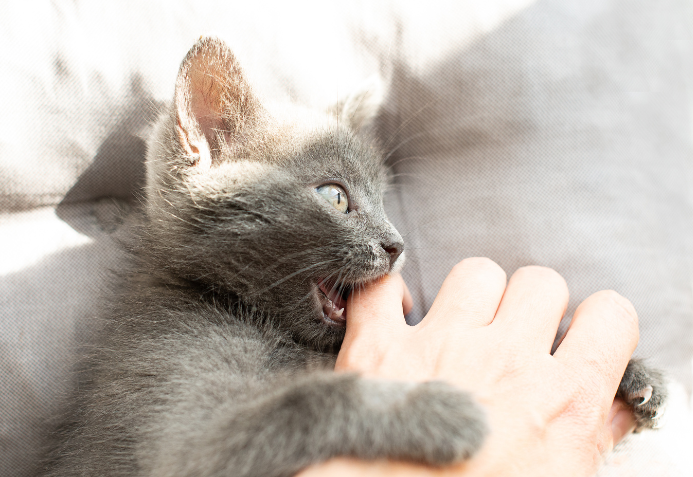Why Cats Bite: Common Reasons and How to Stop Your Cat

Superr Pets is an open platform for pet parents, pet enthusiasts and pet lovers. From free pet resources and tips to stylish pet-themed merchandise, there is a lot that one can explore. Our vision is to promote pet care and make it a better world for us and our furry friends alike.
In this article, we will explore top reasons why cats bite and provide effective strategies to prevent and manage such actions. Let's start!
Common Reasons That Cats Bite
1. Play Biting
This is a common habit for kittens. They learn social skills and hunting techniques through games, which often involves biting. However, if not appropriately trained, this habit can persist into adulthood. When they're overly excited the play redirected aggression leads them to bite or scratch unintentionally.
Do check our pawsitive cat t-shirts and accessories on the cat shop page.
2. Fear, Pain, and Anxiety
An adult cat may resort to biting when she feels threatened or afraid. Pain or discomfort caused by an injury or an underlying health condition can also trigger defensive biting. Additionally, any stress or anxiety, such as changes in the environment or routine, can make them more prone to biting as a means of self-defense. Make sure to check on any other medical issues.
3. Sudden Cat Biting When Petting
Some cats may exhibit sudden biting when being petted (cats lick or love bites). This could be due to play aggression, sensitivity in certain areas, over stimulation, or discomfort. Understanding your pet cat character, and identifying their individual boundaries during petting sessions is crucial to avoid triggering a biting response.
4. Frustration
When cats are unable to fulfill their natural instincts or face obstacles in their environment, they may become frustrated and resort to biting. Frustration can arise from various factors, such as lack of mental or physical stimulation, insufficient amusement, or restricted access to essential resources like nutrition, water, or litter boxes.
How to Stop Your Cat from Biting You
Understand Your Cat's Body Language:
Observing your cat's attitude is vital in preventing biting incidents. Learn to recognize signs of stress or discomfort, such as flattened ears, dilated pupils, twitching tail, or a tense posture. If you notice any of these signals, give your cat space and avoid interactions that might provoke a negative response.
Provide Appropriate Play Opportunities:
Ensure your cat receives sufficient physical and mental stimulation through regular interactive sessions. Use interactive toys, such as toy wands or puzzle feeders, to engage your cat's hunting instincts. This helps redirect their energy and prevents them from resorting to biting.
Turn your cat into an interesting character using SuperrPets customized pet portrait services; choose from our pop culture and renaissance style collection.
Teach Appropriate Fun Activities:
When spending fun time with your cat, avoid using your hands as toys. Instead, provide them with appropriate enjoyable items, such as toy mice or feather wands. If your cat bites or scratches during the routine, immediately stop the game and withdraw your attention. Consistency is key to teaching them that biting ends the joy.
Gradually Desensitize Your Cat to Handling:
Start by offering gentle strokes on areas they enjoy. Gradually introduce touch to sensitive areas, such as the belly or paws, in short sessions. Pay attention to your cat's response, and if they show signs of discomfort, stop and try again later. Reward your cat with treats or praise when they tolerate handling without biting.
Create a Safe and Enriching Environment:
Ensure your cat's environment meets their needs by providing scratching posts, hiding spots, and elevated perches. This allows them to engage in natural actions and reduces frustration. Provide multiple litter boxes, eating space and water stations, and separate resting areas if you have multiple cats, to prevent resource guarding and territorial disputes.
You may find a cat scratching most of the time, but that's general. Read all about your cat's scratching behavior here.
How to Treat a Cat Bite:
While preventing cat bites is the ideal approach, accidents can happen. If you do get bitten by a cat, follow these steps:
-Wash the Wound: Immediately wash the wound with mild soap and warm water. Thoroughly clean the area to reduce the risk of infection.
-Apply an Antiseptic: After washing, apply an antiseptic solution like hydrogen peroxide or iodine to disinfect the wound.
-Seek Medical Attention: Depending on the severity of the bite, it is advisable to seek vet attention, especially if the wound is deep or shows any signs of infection.
-Monitor for Infection: Keep an eye on the wound for signs of infection, such as increased redness, swelling, warmth, or drainage. If any of these symptoms occur, consult a healthcare professional promptly.
Related Read: Important Training Skills to Teach Your Beloved Cat
Conclusion
Understanding the reasons behind cat biting is essential for addressing and preventing any serious affairs.
By providing appropriate entertainment opportunities, recognizing your cat's reactions, and gradually desensitizing them to handling, you can significantly reduce the chances of biting. Remember- patience, consistency, and a safe and enriching environment are key to fostering a harmonious relationship with your feline companion. In case of a cat bite, promptly clean and treat the wound, and seek medical attention if necessary. With care and proper training, you can help your cat develop appropriate habits and ensure a peaceful coexistence.
Follow us on social:
.png)
.png)






.webp)
.webp)